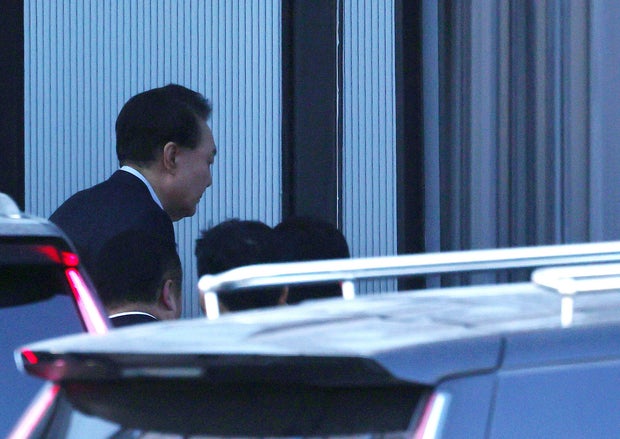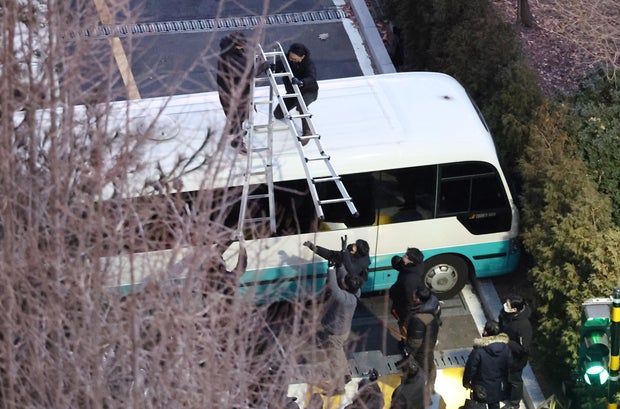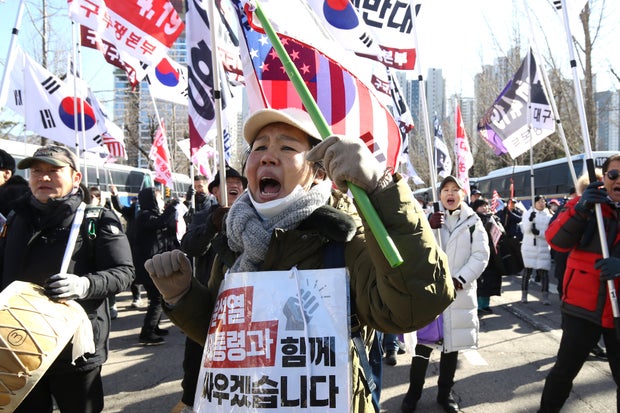South Korea’s impeached president has been arrested as a result of the declaration of martial law

Seoul, South Korea – South Korea’s ousted President Yoon Suk Yeol was arrested at the presidential press conference on Wednesday, defiantly insisting that the anti-corruption agency does not have the authority to investigate his actions but said he would comply to prevent violence.
In a video message that was recorded before he was escorted to the headquarters of the anti-corruption organization, Yoon lamented that “the law has completely broken down in this country.
Yoon, the country’s first president to be imprisoned, has been holed up in a house in Hannam-dong in the capital, Seoul, vowing to “fight to the end” attempts to overthrow him. He has forgiven his own a brief declaration of martial law on December 3 as a formal act of governance against “anti-national” opponents who are using their legal majority to thwart his agenda.
Korea Pool/Getty
The Office of Corruption Perceptions Officers said Yoon was taken into custody about five hours after investigators arrived at the presidential palace and three hours after they successfully entered his home. a second attempt to arrest him over his imposition of martial law.
A series of black SUVs, some armed with flags, were seen leaving the presidential compound, escorted by the police. Yoon was later seen getting out of the car after arriving at the agency’s office in the nearby city of Gwacheon.
Hundreds of Yoon’s conservative supporters gathered near the office of the anti-corruption agency when he was questioned, shouting slogans and holding signs that read: “We will fight President Yoon Suk Yeol.”
An unidentified man was in a life-threatening condition after apparently shooting himself near the scene, according to the Gyeonggi Province fire department.
After interrogation, Yoon was sent to a center in Uiwang, near Seoul. He may be held in custody for weeks.
The anti-corruption agency, which is leading a joint police and military investigation into whether Yoon’s declaration of martial law amounted to attempted treason, has 48 hours to request a court order to formally arrest him for attempted treason, and if it fails to do so, Yoon will be released. If Yoon is formally arrested, investigators can extend his detention for up to 20 days before referring the case to public prosecutors for charges.
The anti-corruption agency told reporters that Yoon, during the first two hours of questioning, exercised his right to remain silent.
Yoon’s arrest warrant, issued by the Seoul Western District Court, said there were serious grounds to suspect that he had committed crimes as a “rebellious leader.”
Yoon’s presidential powers were suspended when parliament impeached him on December 14. The impeachment case is now before the Constitutional Court, which can formally remove Yoon from office or dismiss the case and reinstate him.
In a separate message posted on his Facebook account after his arrest, Yoon said “martial law is not a crime,” and said his announcement was necessary to raise awareness of opponents who use “legal dictatorship by blocking laws and budgets” and “paralyzing” state affairs. He denied accusations of treason, describing his prosecution as a “fraud.”
As they began the crackdown at dawn, anti-corruption investigators and police officers engaged in an hour-long standoff at the compound’s gate with the president’s security forces but did not face any serious resistance.
YONHAP NEWS AGENCY/Reuters
The police were seen using wire cutters to remove the barbed wire that the presidential security unit had placed at the edge of the compound to block their entry. Some police officers used ladders to climb over the rows of buses placed by the presidential security unit near the entrance of the compound, and the investigators began to climb up the hilly area. Investigators and police later arrived in front of the iron gate with the golden presidential seal near Yoon’s building. Some policemen were seen entering through the security door on the side of the iron gate, together with one of Yoon’s lawyers and his manager. The presidential security forces later removed the bus and other vehicles that were parked inside the gate as a barrier.
Without a court order for Yoon’s arrest, the presidential security service insisted it was responsible for protecting the embattled president and fortified the compound with barbed wire and lines of buses blocking roads.
South Korea’s acting leader, Vice Prime Minister Choi Sang-mok, issued a statement early Wednesday urging law enforcement and the president’s security forces to ensure there were no “physical confrontations.”
After Yoon’s arrest, Choi met with officials from the Group of Seven Nations, including the United States, Japan, Britain and Germany, as well as a representative of the European Union, to ensure that the government is operating stably.
Park Chan-dae, the grassroots leader of the opposition Democratic Party, which led the legislative campaign that led to Yoon’s impeachment on December 14, said Yoon’s arrest “is the first step to restore constitutional order, democracy, and the rule of law. .”
While the investigators went up to the yard, lawmakers from Yoon’s People Power Party held a rally in the streets nearby, denouncing the efforts to detain him as illegal.
The National Police Agency has met with field commanders in Seoul and nearby Gyeonggi province in recent days to plan their arrest efforts, and the size of those forces is fueling speculation that more than 1,000 police could be deployed. The agency and the police have come out and warned that they may be arrested by the president’s bodyguards who prevent the issuance of a warrant to continue the investigation.
Yoon’s lawyers said the arrest warrant issued by the Seoul Western District Court was illegal. They cited a law that protects areas that may be linked to military secrets from searches without the consent of the person in charge – which would be Yoon. They also said that the anti-corruption organization does not have the legal authority to investigate allegations of apostasy.
“I’m surprised to see illegal things about illegal things being done and procedures being done by force under an invalid warrant,” Yoon said in a video released before his arrest. “I do not approve of the investigation by the Office of Corruption Investigation of High-ranking Officials. As the president, who is responsible for upholding the constitution and legal system of the Republic of Korea, my decision to go along with illegal and illegal practices is not to inform about them, but rather to be determined to prevent terrible and bloody events.”
Chung Sung-Jun/Getty
Yoon’s supporters and critics held competing protests near the residence – one side vowing to protect him, the other calling for his arrest – while thousands of yellow-jacketed police kept a close watch on the tense situation.
Yoon declared martial law and deployed troops to the National Assembly compound on December 3. It took several hours before lawmakers were able to break the deadlock and vote to remove the measure. The opposition-led assembly voted to impeach him on treason charges on December 14.
The Constitutional Court held its first official hearing in the impeachment case on Tuesday, but the meeting lasted less than five minutes because Yoon refused to attend. The next hearing will be held on Thursday, and the court will continue the trial whether Yoon is present or not.
The White House National Security Council released a statement saying the United States stands by its support for the Korean people and “our shared commitment to the rule of law.” It said that Washington is still willing to work with the government led by the acting leader of Seoul, Choi, and affirms the strength of the coalition of countries.
Source link






